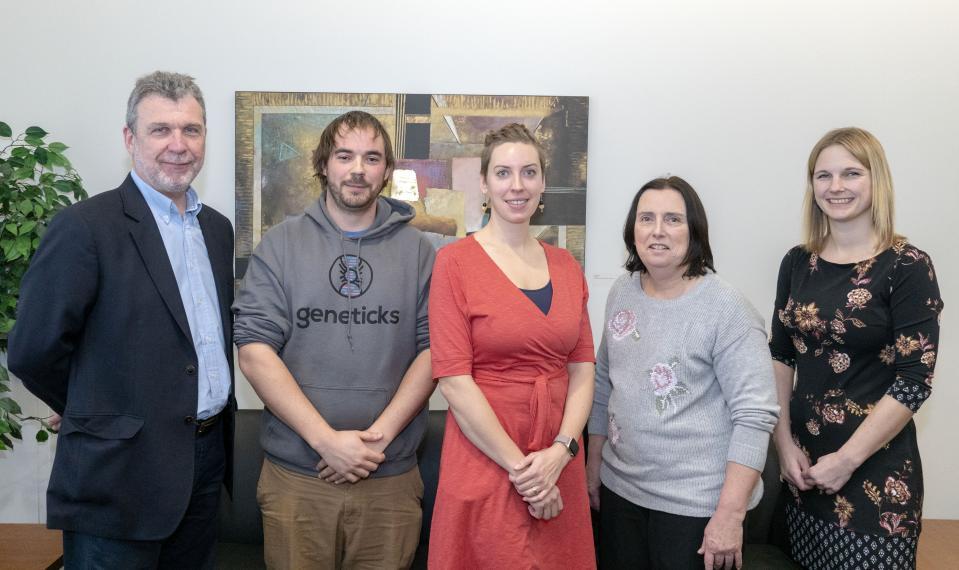Undergrad class discusses the challenges of Lyme disease with visiting panel of experts

The guests spoke with the students of BIOL 4020, a class taught by Profs. Justine Tishinsky and Brian Husband that addresses complex problems in biology that require integrative solutions. The class has also been working with Dr. Melanie Wills, director of the G. Magnotta Lyme Disease Research Lab here at the University of Guelph, to discuss the challenges of Lyme disease and gather information on the current struggles and unknowns.
Sue Faber, co-founder and director of LymeHope
Advocate on behalf of Canadians affected by Lyme disease with a focus on families and children. Expert on the peer reviewed literature as pertains to in-utero transmission of Lyme disease and congenital Lyme borreliosis. Supports research which is anchored in patient priorities and values. More information of our work can be found at www.lymehope.ca
Linda Kelso, founding member of Ontario Lyme Alliance
When a family member was diagnosed with late-stage Lyme disease/co-infections in early 2012, we considered ourselves very fortunate to find out that one of the two Lyme support groups in Ontario was within easy travelling distance. The following year, my husband and I stepped in and began running the York North Lyme Support Group. We hold meetings eight times a year to provide support for the ever-increasing number of Ontarians who find themselves experiencing late-stage Lyme disease. In 2013, several members of the support group met to discuss the need for a patient advocacy group to push the provincial government to make changes to diagnosis, testing and treatment. This group, of which I am a founding member, became known as the Ontario Lyme Alliance. The Ontario Lyme Alliance influenced the passing of two pieces of provincial legislation related to Lyme disease and vector-borne diseases. As a result, the Ministry of Health and Long-term Care began to work on the development of a provincial framework for Lyme disease and tick-borne illnesses in 2015. I was appointed by the then Minister of Health, Dr. Eric Hoskins, to represent the Ontario Lyme Alliance on the Lyme Disease Stakeholder Reference Group (LD SRG) which he established in August of 2015. The LD SRG continues to meet twice a year. In the winter of 2018, I was a member of the Ontario Lyme Disease and Tick-borne Illnesses Task Force initiated by the Minister of Health. The Task Force submitted its report to the Minister in April of this year. As well, I was a member of the Lyme disease Working Group which was charged with providing advice and guidance to Health Quality Ontario and Public Health Ontario in the development of two documents. One document pertained to tick bite management and the other to diagnosis and treatment of early localized Lyme disease in Ontario. As well, I represent the Ontario Lyme Alliance on the Public Health Agency of Canada’s tick-borne diseases stakeholder group. I am also a member of both Lyme Ontario and the Canadian Lyme Consortium.
Justin Wood, owner of Geneticks
My expertise in Lyme disease comes from being a researcher, business owner and a Lyme disease patient. I received my B.Sc.H in biology from Queen's University with a specialization in molecular biology and genetics, before going on to do my Master's degree in functional genomics at the University of Calgary. During this time, I began to get increasingly ill with non-descript neurological symptoms, which would eventually be diagnosed as Lyme Neuroborreliosis. I was scheduled to begin a PhD at the Hotchkiss brain institute, before becoming too sick, and being forced to withdraw. After spending a number of years too sick with Lyme disease to work, I began to improve in late 2017. As I improved, I founded a tick testing company called Geneticks which uses genetic techniques to detect pathogens, such as those that cause Lyme disease, in ticks.
Ellen Hohs, president of Lyme Ontario
I have Lyme disease. I grew up in Turkey Point spending summers there. I help patients fight for correct diagnosis, testing and treatment. I also meet with PHAC regarding Lyme disease in Canada. More information about Lyme Ontario can be found here: http://lymeontario.com/about/about-us/
Dr. Beverley Bateman, member of Ontario Lyme Alliance / veterinarian and owner of Eglinton Veterinary Facilities
I work in a small animal veterinary practice and counsel clients on tick-borne illness and tick bite prevention for pets and people. Additionally, I am a patient with Lyme disease and other vector-borne illnesses. I became ill in 1996 and was not diagnosed until 2012. I have been in consistent treatment for tick-borne infections since June of 2012, originally through a physician in the U.S., and now by a physician here in Toronto. I am also an active member of an advocacy group called the Ontario Lyme Alliance, which is focused on lobbying provincial health officials to push for changes to the medical system to allow for better recognition and treatment of patients with Lyme disease. In this capacity, I have been involved in two provincial groups which are looking at Lyme disease management: (a) The Lyme Disease Stakeholder Reference Group and (b) the Ontario Lyme Disease and Tick-borne illnesses task force, which produced a report in the spring of 2018 entitled: Lyme disease and tick-borne illnesses Task Force report.
Jocelyn Rivers, chief happiness officer at Novometrix Research Inc.
I do public health research around One Health Issues. Using mixed methods, my background is in social science, I am focused on bringing partners together to identify problems and assist in facilitating solutions-oriented thinking and processes. I work with stakeholders who are affected directly or indirectly by Lyme. In my personal life, I have a dog and an infant and walks/hikes are a very important part of our lifestyle, so the risk is heightened for us as warmer temperatures are becoming the norm.